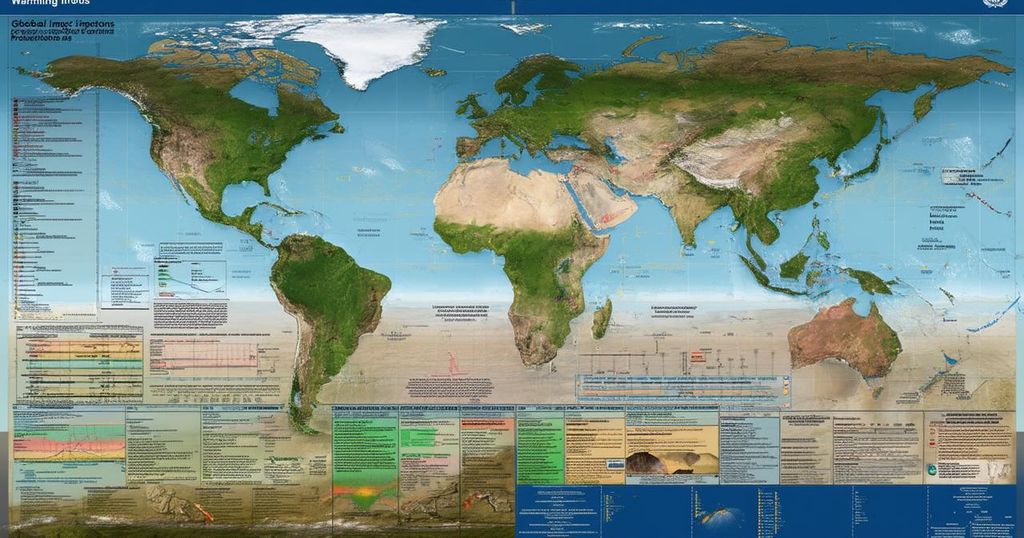UN Warns of Catastrophic Future Climate Projections Amidst Rising Emissions
The United Nations warns that the world is heading towards a catastrophic global warming of up to 3.1 degrees Celsius this century unless significant efforts are made to reduce emissions. The UN Environment Programme urges global leaders to dramatically increase their climate action commitments ahead of the upcoming Cop29 conference in Baku, Azerbaijan. The report indicates that greenhouse gas emissions reached an all-time high, necessitating a reduction of 42% by 2030 and 57% by 2035 to meet climate targets under the Paris Agreement.
The United Nations has issued a dire warning stating that the world is on a trajectory towards a potentially catastrophic increase in global temperatures, projected to reach as high as 3.1 degrees Celsius by the end of the century. In its latest report, the UN Environment Programme (UNEP) emphasized that achieving the target of limiting temperature rise to 1.5 degrees Celsius necessitates unprecedented collective action to reduce the greenhouse gas emissions driving climate change. The report highlights that current commitments and actions by nations are insufficient, which could result in temperature increases between 2.6 and 3.1 degrees Celsius, depending on the implementation of promised measures. With the next UN climate conference, Cop29, looming in Baku, Azerbaijan, the urgency for significant financial support for developing nations to combat climate change was underscored. UNEP’s report revealed a concerning rise in greenhouse gas emissions, which reached an all-time high in the previous year, with a noted 1.3% increase from 2022. It is essential that nations renew their commitments under the Paris Agreement to cut down emissions from activities such as fossil fuel combustion, while expanding efforts to enhance carbon capture through forest restoration and similar initiatives. As countries prepare for new climate action plans with a timeline extending to 2035, UNEP cautions that the goal of limiting global warming to 1.5 degrees is increasingly unattainable. UN Secretary-General António Guterres articulated the precarious position the planet is in, stating that lack of decisive action could plunge the world into severe climate emergencies resulting in intensified natural disasters affecting the most vulnerable populations. He emphasized the need for global leaders to urgently narrow the emissions gap to avert impending climate disasters. Furthermore, Inger Andersen, UNEP’s Executive Director, reinforced that effective measures taken now can significantly mitigate adverse climate impacts, stressing the importance of achieving substantial emissions reductions by 2030 and 2035 including an ambitious increase in renewable energy capacity. The report calls for a collective 42% reduction in annual greenhouse gas emissions by 2030 and a further 57% by 2035, an endeavor deemed technically feasible through enhanced renewable energy adoption and efficiency improvements. It is imperative that the G20 countries lead this global initiative to reverse current trends of rising greenhouse gases and achieve meaningful climate action.
The United Nations (UN) has consistently stressed the importance of addressing climate change as global temperatures rise due to human activity. The Paris Agreement, established during climate talks in 2015, set specific targets to prevent temperature increases exceeding 2 degrees Celsius compared to pre-industrial levels, with an ideal limit of 1.5 degrees Celsius. Achieving these goals requires countries to develop actionable plans, termed nationally determined contributions (NDCs), to reduce emissions from sectors like energy, transportation, and industrial processes. The UNEP’s annual emissions gap report assesses the difference between what is needed to meet these climate goals and the current progress made by countries. With growing evidence of detrimental climate impacts, including extreme weather events and declining natural ecosystems, the urgency for effective climate action has intensified.
In summary, the UN’s latest findings present a stark reality regarding the trajectory of global warming, cautioning that current policies and actions are inadequate to meet the critical climate targets established in the Paris Agreement. Urgent and escalated efforts are required to reduce greenhouse gas emissions significantly, particularly by major emitting nations, to avert the predicted catastrophic temperature rise of up to 3.1 degrees Celsius by the century’s end. Without a unified and immediate response, the global community risks facing severe and lasting consequences from climate change.
Original Source: www.irishnews.com




Post Comment